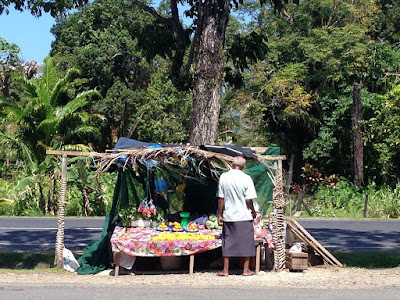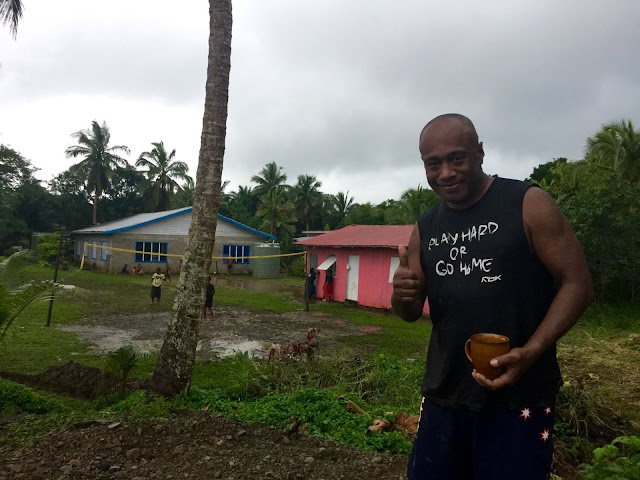Mike was invited by a former colleague to give a presentation to the Fijian Medical Association about his experience in Afghanistan. We decided to take a long weekend in Fiji together.
The flight from Auckland to Fiji is about 3 hours.
 |
| The conference provided our accommodations and food, but we paid for our own airfare. |
On Friday, we picked up a rental car and drove about an hour around the coast to the conference location.
 |
| Be smooth with the cheeks, boys... |
Pictures out the car window during the drive...
 |
| This is the main highway in Fiji, a bumpy road without very many passing lanes. It circles the island. |
 |
| Lots of open-air houses, palm trees, people flagging down rides, and stray dogs. |
 |
| This is a bus stop. There were also pedestrians along the road, walking along or flagging down rides from anybody driving a car who had extra space. We took 3 women into Suva for their catering course on Monday morning. |
 |
| Papayas and pineapple especially delicious in Fiji right now. |
 |
Kids playing volleyball in the mud and warm rain. This friendly guy told us that
he and they are here at their SDA church for a clean-up activity (Seventh Day Adventist). |
After driving for about an hour, we arrived at a beautiful resort and conference location.
That same afternoon we drove BACK to Suva for a fascinating tour of the main hospital in Suva. Our host is one of three practicing nephrologists in the country. None of these nephrologists actually has nephrology training in the way we would think of it in NZ or in the USA. They are general practitioners who have decided to practice nephrology. It's amazing what they manage to accomplish with very limited resources. Our host could have stayed on in New Zealand, but moved back to Fiji because he wanted to make a difference in his homeland. When he first moved back to Fiji, his annual salary was about $18,000USD. The government passed an 82% pay increase for physicians just this year, in an effort to keep more of them in the country.
 |
After the tour, our host took us to his house briefly to meet his wife and two daughters. Mike and I went on a 20 minute walk around the neighbourhood and found this muscly, sweaty, friendly 15's team. They liked having their picture taken.
|
 |
| Our nephrologist-host's home, where he lives with his wife and 2 kids. They rent the bottom floor. |
Our host just set up his own private practice, which consists of himself, a janitor, and one dialysis machine. He read the manual to set up the dialysis machine and repairs it when needed.
Mike woke up to see this awesome sunrise.
Everyone at the conference stayed in the same resort and took all their meals together. I found it fascinating to hear about the day-to-day issues of practicing medicine in Fiji. One senior resident presented a case about a time she was doing her "periphery" (required first assignment to a remote location) and saved a man's life by making her own chest tube, since the clinic had run out. Another doctor presented a case of a woman with a butterknife lodged in her abdomen (stabbed). He also improvised as the clinic was out of C-collars, the ultrasound machine was down, and ambulance was (luckily) working but was unstocked. He managed to stabilise patient and get her safely to a bigger hospital. We heard many stories about improvising without supplies, improvising without staff, improvising when phones, ultrasounds, and x-rays weren't working, deciding which of two patients got the one ventilator, etc.
When our host arrived back in Fiji, there were no working dialysis machines in the hospital, so emergent patients that could have been saved with a day or two of dialysis died in the emergency room. He actually found a dialysis machine, but no one knew how to work it, so it had just been sitting in a corner until he arrived. According to my understanding, there were dialysis machines at a one private center before our host arrived in the country, but none in the public system.
Even though it seems like there's so much work to do in Fiji, our host and his wife volunteer their time 3 times per year in Nauru, which is a remote Pacific state that has even fewer medical resources than Fiji.
Presentation went well! Mike was relieved when it was done.
 |
| These are the people at our table during the final lunch of the conference. Our host on the left. Then Mike and I. Then two emergency med residents in Suva (two of first 6 in Fiji to be finishing EM training). Then the 14-year-old daughter of Dr. Singh (the woman next in line) and the only Mormon in her family. Then Dr. Singh, who is the only rehab physician in Fiji, a country that performs 700 amputations per year - significantly more than NZ - because of poor diabetes management. She is also the aunt of the guy in the middle. We were introduced to her by a senior LDS missionary couple, the Clarks, who have been working with her to provide prosthetics. Next in line is another nephrology-specialised physician, and finally the friendly wife of the guy in the middle. |
I enjoyed several long conversations with the LDS humanitarian missionary couple who were also presenting at the conference, the Clarks.
We never figured out why here are no Indian-Fijian surgeons - only iTaukei-Fijian surgeons. Not sure if that's related to the attitude of one expat-Indian-Fijian presenter who chided Fiji in his presentation for being "third world" and not organising inexpensive supplies like C-collars and chest drains.
Finally, we spent Sunday evening at the mission president's home with the Higgins. The Higgins are our friends from New Zealand who have been in Fiji for 2 months now. They had all the senior couples from the mission over for dinner, along with three visiting church humanitarian employees. The humanitarian folks gave a presentation after dinner. I enjoyed hearing Sr Higgins' stories as I sat next to her at dinner, as well as getting a glimpse into the wide variety of personalities and backgrounds of the senior missionary couples. One couple introduced themselves because they just arrived in Fiji - seemingly-untraveled Idaho farmers who had sold off a piece of their 2000 acres to come on their mission. Another couple, the Clarks, had already traveled the world, wealthy and well-versed Mormon intellectuals and collectors. All the couples were from USA or Canada with the wonderful exception of one Islander couple. Another couple from Canada weren't official missionaries since her health disqualified them. They decided to "call themselves" on a mission to Fiji and have been living there for the last nine years.
 |
| Higgins |
Meanwhile, back in New Plymouth, the kids were in the good hands of Jess, Levi and baby Aslan. The All-Blacks played in New Plymouth (first time since we moved there). Mercy and a friend got to go. Oak also got to watch some of the game while selling donuts.

update from Oak (who gets paid a commission to sell donuts):

update from Danny, who got a job doing concessions at BYU football games:

and earlier in the week...

Books:
 |
Thanks, Melissa!
This was a provocative book and
the perfect length for the plane rides. |



























